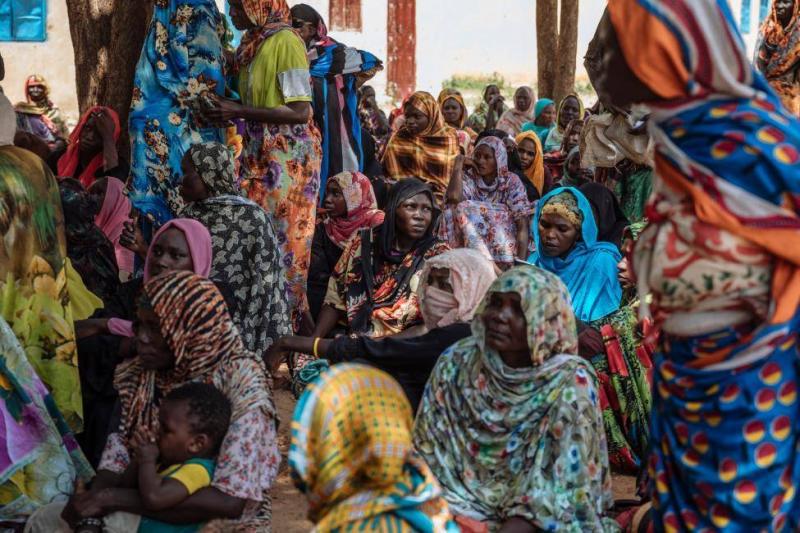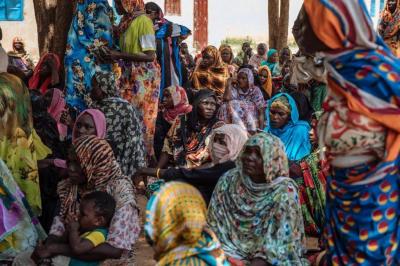The fighting in Sudan, which has entered its third week, is causing a humanitarian crisis as gunfire and explosions resonate throughout the capital. The conflict poses a risk of a broader catastrophe, while neighboring poor countries deal with a refugee crisis, and the fighting hampers the delivery of aid in a country where one third of the population relies on some external assistance.
Today, the Ministry of Foreign Affairs of South Sudan announced that Sudanese Army Commander Abdel Fattah al-Burhan and Rapid Support Forces Commander Mohamed Hamdan Dagalo have agreed in principle to a seven-day truce starting on May 4. The statement indicated that both sides agreed to appoint representatives for peace talks. For his part, South Sudan's President Salva Kiir emphasized the importance of a longer ceasefire and the appointment of representatives for peace discussions.
UN officials announced today that the war in Sudan has forced 100,000 people to flee across borders. UNHCR spokesperson Olga Sarado disclosed in a press briefing in Geneva that "the number of refugees who have now crossed into neighboring countries, including Sudanese refugees, is estimated at over 100,000." The International Organization for Migration also reported that 334,053 people have been displaced within Sudan since April 15.
Furthermore, U.S. State Department Deputy Spokesperson Vedant Patel confirmed that the U.S. Consulate in Jeddah has received over 350 American citizens and lawful permanent residents, offering assistance after their escape from Sudan. Paul Dillon, spokesperson for the organization, noted that "in many cases, small convoys face the ongoing challenge between the warring factions, creating a very difficult and dangerous situation for those embarking on these journeys."
The British government announced today in a statement: "British nationals who still wish to leave the country should proceed to the Coral Hotel in Port Sudan by 10:00 Sudan time on May 3," and Foreign Secretary James Cleverly tweeted: "After successfully evacuating 2,341 people on 28 flights, the last UK flight is expected to leave Port Sudan tomorrow."
White House spokesperson Karine Jean-Pierre stated that "humanitarian agencies must be allowed access to assist people in Sudan amidst renewed fighting despite the supposed truce." UN humanitarian coordinator Martin Griffiths is expected to visit Sudan today. His spokesperson mentioned that one of his priorities is "to improve the delivery of humanitarian assistance through safe passage guarantees."
Six containers with supplies have been sent to Port Sudan, with 30 tons of aid awaiting dispatch in Dubai, according to a WHO official.
**A Regional Crisis?**
Michael Dunford, Regional Director for the World Food Program in East Africa, warned that "the risk is this will not just be a Sudanese crisis but will become a regional crisis," noting that "Port Sudan, which thousands have fled to from Khartoum seeking evacuation, is a key entry point for aid for many countries in the region." He added, "If we do not stop the fighting now, the impact on humanitarian operations will be immense."
Kenyan Foreign Minister Alfred Mutua revealed that his country has offered to use its airports and landing sites near the border with South Sudan as part of international humanitarian efforts. Most European countries have ended their evacuation efforts. Russia announced today that it has evacuated 200 of its citizens.
**Arab League Stance**
The Arab League called for an immediate and unconditional cessation of all hostilities in Sudan, urging the preservation of the sanctity of diplomatic missions and the safety of their staff. It also condemned the targeting of civilians and civilian infrastructure, particularly medical facilities.
**Cairo to Support Dialogue**
Egyptian President Abdel Fattah al-Sisi announced that Cairo will support dialogue in Sudan between the conflicting parties but is also keen on "not interfering in internal affairs." In an interview with a Japanese newspaper, he cautioned that the entire region "could be affected."
Egyptian Foreign Minister Sameh Shoukry reiterated his country's position "calling for an immediate ceasefire and the importance of all parties committing to uphold the truce to allow humanitarian relief efforts and healing to begin, as well as to start a serious dialogue aimed at resolving existing disputes."
Shoukry conveyed, during a meeting with Sudanese army commander Abdel Fattah al-Burhan's envoy, the "grave concern" of Egypt over the ongoing situation in Sudan. The Egyptian Foreign Ministry stated that the Sudanese envoy relayed a verbal message from Burhan to Egyptian President Abdel Fattah al-Sisi regarding the developments in Sudan, and expressed gratitude to Egypt for hosting Sudanese fleeing the war.
In a separate statement, the Egyptian Foreign Ministry noted that around 16,000 people have crossed the border from Sudan into Egypt, including 14,000 Sudanese. Estimates from Sudan's Health Ministry and the UN indicate that at least 500 people have been killed and thousands injured due to fighting in the capital Khartoum and other areas, with the international organization believing the actual death toll to be much higher. The power struggle between the Sudanese army and the Rapid Support Forces erupted on April 15.




